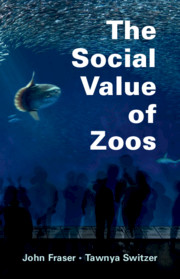Book contents
- The Social Value of Zoos
- The Social Value of Zoos
- Copyright page
- Contents
- Figures
- Tables
- Preface
- Acknowledgments
- Chapter 1 Context
- Chapter 2 Ontology
- Chapter 3 Learning
- Chapter 4 Morality
- Chapter 5 Pleasure
- Chapter 6 Meaning
- Chapter 7 Bonding
- Chapter 8 Connectedness
- Chapter 9 Identity
- Chapter 10 Activation
- Chapter 11 Impact
- Chapter 12 Integration
- References
- Index
Chapter 2 - Ontology
Animal Exhibits and Conservation Goals
Published online by Cambridge University Press: 26 March 2021
- The Social Value of Zoos
- The Social Value of Zoos
- Copyright page
- Contents
- Figures
- Tables
- Preface
- Acknowledgments
- Chapter 1 Context
- Chapter 2 Ontology
- Chapter 3 Learning
- Chapter 4 Morality
- Chapter 5 Pleasure
- Chapter 6 Meaning
- Chapter 7 Bonding
- Chapter 8 Connectedness
- Chapter 9 Identity
- Chapter 10 Activation
- Chapter 11 Impact
- Chapter 12 Integration
- References
- Index
Summary
Chapter 2 delves more deeply into the recent evolution of zoos and aquariums in the conservation movement, referring to how the history of animal research impacts decision-making in zoos and highlighting conservation biology and conservation psychology as frameworks that emerged in part from conservation agendas in the zoo industry. While the default education programming and evaluation tools in most zoos continue to be based on an information transfer model of learning, here we introduce research situating the social purpose and role of the zoo that suggests this approach is not speaking to public audiences in the language of their values and expectations. We conclude with a discussion of how these findings are related and might inform new questions, approaches, and measurements of mission success, noting that a value proposition for conservation education that promotes the moral and ethical responsibilities of individuals, communities, and societies to protect and preserve wild species and wild spaces is a logical complement to existing educational programming designed to increase the factual knowledge of public audiences. We argue that zoo messaging and experiences must simultaneously help learners of all ages see themselves as embedded within natural systems – and see and value biodiversity as valuable, irreplaceable, and worthy of active protection and behavior change.
Keywords
- Type
- Chapter
- Information
- The Social Value of Zoos , pp. 18 - 28Publisher: Cambridge University PressPrint publication year: 2021

